Oscar-Nominated Film Director of “The Present” Farah Nabulsi talks exclusively to a&e on winning international awards, following her passion and representing Arab women on a global scale.

Farah wears : BVLGARI FIOREVER Earrings in White Gold, set with round brilliant-cut Diamonds and pavé Diamonds. BVLGARI FIOREVER Necklace in White Gold set with round brilliant-cut Diamonds and pavé Diamonds. BVLGARI FIOREVER Necklace in White Gold with Diamonds and Diamonds pave BVLGARI FIOREVER Rings in White Gold with Diamonds, and Diamonds pave. Blazer and blouse, Giorgio Armani
Elegant, poised and ready for anything, Palestinian Film Director Farah Nabulsi arrived on set to our shoot in Dubai like a breath of fresh air. You would never know this in-demand woman has spent her recent evenings on Zoom calls with national TV channels in the United States and interviews with top journalists in the United Kingdom and the rest of the world. One of the most talked-about women in film right now, Nabulsi is one of the few female Arab directors to be nominated for both a BAFTA and Oscar and she’s taking it all in her stride. With barely any sleep, she is running on adrenaline after an incredible few months of award nominations and global recognition for her short film; “The Present”, before she jets off to Los Angeles for the 2021 Academy Awards ceremony later this month. It’s every Film Maker’s dream to win (or be nominated for) an Academy Award, but as an Arab woman and for her first-ever film as a director, this is an even more significant milestone for Farah Nabulsi.
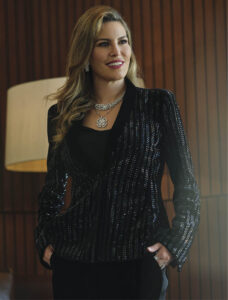
Farah wears : BVLGARI FIOREVER Earrings in White Gold, set with round brilliant-cut Diamonds and pavé Diamonds. BVLGARI FIOREVER Necklace in White Gold set with round brilliant-cut Diamonds and pavé Diamonds. BVLGARI FIOREVER Necklace in White Gold with Diamonds and Diamonds pave BVLGARI FIOREVER Rings in White Gold with Diamonds, and Diamonds pave. Blazer and blouse, Giorgio Armani
WATCH MORE HERE…
But when Nabulsi has her red carpet moment at the Oscars this April, it will only be the beginning of her journey. After first debuting at the Clermont-Ferrand International Short Film Festival in January of this year, “The Present” won the Audience Award for Best Film and subsequently went on to win awards around the globe. The big moment came earlier this month when “The Present” won Best Short Film at the BAFTAs as well as a nomination for Best Short Film at The 2021 Academy Awards. But while many Film Directors may strive to win awards, for Nabulsi the rewards run much deeper than that.
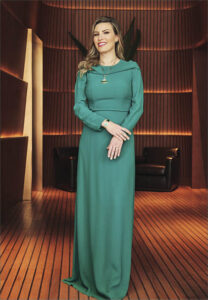
BVLGARI DIVAS’ DREAM EARRINGS in rose gold set with Malachite and round brilliant-cut Diamonds.
BVLGARI Divas’ Dream Necklace in Rose Gold set with Malachite, Diamonds, and pavé Diamonds. Special edition exclusive to Middle East.
BVLGARI DIVAS’ DREAM Watch in Rose Gold set with brilliant-cut Diamonds, Malachite dial, Diamond indexes and green Alligator strap
BVLGARI DIVAS’ DREAM Ring in Rose Gold set with Malachite and pavé Diamonds.
Dress, Dolce&Gabbana
Born to Palestinian parents in London, Nabulsi trained as a banker before working in finance and then going on to run her own company for ten years. But it wasn’t until a trip back to her home country in 2013 that the trajectory of her life took a dramatic change. When visiting Palestine, Nabulsi was faced with the challenges and struggles Palestinians face on a daily basis. She discovered how the basic right of freedom to move is heavily restricted by Israeli checkpoints in the West Bank and how many Palestinians face a daily battle doing tasks as simple as going to the shops or getting to work. When she discovered the way many Palestinians are living in the home country, Nabulsi felt compelled to share the stories of the people she met. She began to put pen to paper and describe some of the stories she had discovered through her words. Nabulsi was so deeply affected by the stories that she felt the need to do something more. Having always been interested in film, she began to teach herself firstly how to produce films and then subsequently to direct. In 2016, she founded Native Liberty Productions, a not-for-profit media production company, that aims to re-humanise the people of Palestine and draw attention to the injustices they face. “The Present” is her first film as a director but is the one that is most dear to her heart as it shares such a simple but crucial story that Farah believes the world needs to understand on a deeper level. As “The Present” continues to attract global attention Farah is already thinking of her next move as she works on her first feature film. Here we talk exclusively to Farah during a recent trip to Dubai as she shares some of the challenges, achievements and opportunities she has found on her journey so far.
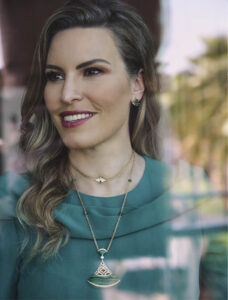
BVLGARI DIVAS’ DREAM EARRINGS in rose gold set with Malachite and round brilliant-cut Diamonds.
BVLGARI Divas’ Dream Necklace in Rose Gold set with Malachite, Diamonds, and pavé Diamonds. Special edition exclusive to Middle East.
BVLGARI DIVAS’ DREAM Watch in Rose Gold set with brilliant-cut Diamonds, Malachite dial, Diamond indexes and green Alligator strap
BVLGARI DIVAS’ DREAM Ring in Rose Gold set with Malachite and pavé Diamonds.
Dress, Dolce&Gabbana
Talk us through how you felt when you found out you were nominated for a 2021 academy award?
Honestly, I felt and still feel extremely grateful and absolutely thrilled, but at the same time, very overwhelmed. With this has come a lot of interest and attention, but also responsibility because of the different hats I wear as an individual and because of what the film is about. As an Arab, female, British, filmmaker who’s made a film about a very under-represented group of people, based on a cruel reality, there’s a lot of responsibility.
You chose to share your story in the format of a short film – what was the thought process behind this?
I think for me it was really that simple. It didn’t need to be longer than that. Of course, when it comes to the injustice and the suffering and the different parts of control systems in Palestine, there is so much more to share, but, I was zooming in on one aspect; the checkpoint and zooming in on one family. I certainly wanted to humanise the story and I think by using one father and his daughter I was able to do this. I took a really simple action or experience that anyone in the world has to do; going to the shops – could it be more simple? And I placed it into a complex, messed up, absurd landscape. So the story didn’t need to be complicated as everything else lent itself to explain the bigger picture. I think everything that happens to this man and his daughter can happen to anyone of us: it can start to rain, your kid could need the bathroom, you could suffer from a migraine or back pain etc, these are all universal situations that happen on a normal day out with your children, and you deal with them because in the normal landscape: you would hail a taxi or buy some painkillers. There are always solutions. But this story shows what many Palestinians have to go through, even for something as simple as a shopping trip. It depends where they live and on their proximity to these checkpoints, but even a simple action like this can be so traumatic, humiliating and exhausting. And that’s on a good day! What about on a bad day? What can happen then? That’s aside from some of the things that take place at these checkpoints. People have died at them, given birth, been unable to get to school, to university, to their hospital appointments. There is so much more that could have been included, but this simple story of going and coming manages to explain the whole situation in a very simple way. In its essence, it’s about freedom of movement. The freedom to go and come as you please like pretty much everyone else in the world. The most basic of human rights.
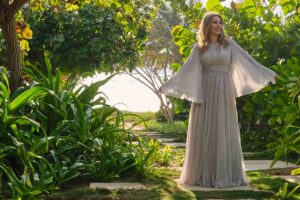
Farah wears: BVLGARI SERPENTI Earrings in Pink Gold, set with pavé diamonds.
BVLGARI SERPENTI Necklace in Pink Gold set with pavé Diamonds
Dress, Dolce&Gabbana
What is the message that you aim to share through this film?
It’s something that’s already happening and it has been for the past year as the film has been shown at festivals all around the world and I have been doing a lot of interviews with the media. In some ways, I could be called a purpose-driven filmmaker because I like to make films that have depth and meaning and raise the global social conscience around them. Yes it’s fiction but it’s based on reality and I certainly want people to consider that reality very deeply and to contemplate such a life, and I would like them to want to learn and understand more about that reality and how it affects hundreds of thousands if not millions of Palestinians every day. I’m here to have those conversations beyond the film. So ultimately what I want people to do is truly ask themselves if they would accept it for themselves and if not, then why should others? That’s really the bottom line. I want people to talk about it, learn more about it and if they feel compelled, to take action.
What was a challenge you faced while you were making the film and how did you overcome it?
When you make a film, there are so many challenges. Forget the topic of my film and where we filmed it, making films are overwhelming and exhausting! You find yourself troubleshooting the whole time and racing against time and budget and literally chasing the light! So that in itself is overwhelming and there are so many issues to deal with. Then there’s the fact that I chose to make a film in essentially occupied territory.
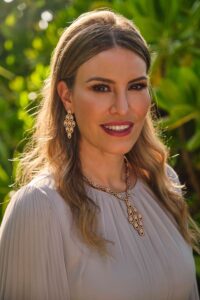
Farah wears: BVLGARI SERPENTI Earrings in Pink Gold, set with pavé diamonds.
BVLGARI SERPENTI Necklace in Pink Gold set with pavé Diamonds
Dress, Dolce&Gabbana
I wanted the film to be extremely authentic and I knew it would be possible to film in Palestine as I was directing it myself. Fortunately, the right introductions were made for me to have the right people on the ground to work with, so I chose to make the film in what is essentially occupied military territory. We were going into an unknown and it’s important to be wise about where you’re shooting and how you’re shooting. There are three zones in the West Bank; A, B and C, and in areas B and C it’s a lot harder to shoot as there are more checkpoints and more military presence. So we ended up choosing to be mostly in area A. We had to contend with things like our casting crew having different identifications and permits so some had to go through checkpoints and others didn’t. There was the problem of selecting locations. A lot of the places I wanted to film was in areas B and C which was very frustrating because those were the quieter rural areas that actually I wanted for the film. On-screen it appears that everything is quiet but behind the scenes, we were stopping traffic and dealing with noise which was very frustrating. In fact, the entire time that we were shooting in the main checkpoint, up on a hill close by was a settlement where they were doing construction and there was constant drilling. The sound on a film is really important for continuity and it was very frustrating! So this is why in the scene where the actor is in the cage, I decided to sound engineer the drilling sound that was actually existing. You can hear music and then there is this build-up of sound in the scene. That’s the real sound of the drilling and then we layered it. But it turned out to almost be representative of the character’s stress and depression. So there were all these frustrating elements because of this landscape and this dynamic. We shot scene two at a real checkpoint. It’s an infamous checkpoint called checkpoint 300 in Bethlehem where hundreds of thousands of Palestinians pass through to go to work every day. The only fiction in that scene is our actor Saleh Bakri who plays Yusef. It was a scene I felt very strongly about and I wanted it to be authentic and I don’t think I could have replicated that. We went in documentary-style and I think in some ways you could say that was quite risky, but we got incredible footage and it was really rewarding, so I’m really happy we did it. I personally put myself through that checkpoint to experience it with the masses and it’s horrendous. I think to myself to do this every day, just to earn a living – how do you come home and be with your family after that? It steals hours from your life and not pleasant hours. You are not even in the luxury of a vehicle, you are literally being herded like cattle for hours.
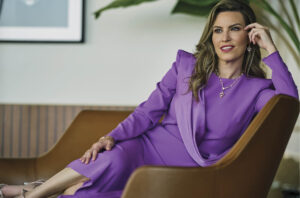
Farah wears: BVLGARI DIVA’S DREAM Necklace in Rose Gold with Rubellite, Amethyste, Diamonds, and Diamonds pave
BVLGARI DIVA’S DREAM Earrings in Rose Gold with Rubellite, Amethyste, Diamonds, and Diamonds pave
BVLGARI SERPENTI VIPER Bracelet in Rose Gold with Diamonds and Diamonds pave
Dress, Alex Perry at Bloomingdale’s Dubai
Let alone being with a child. Tell us about the beautiful girl who plays Yasmine in the film.
Yasmine is played by Mariam Kanj. She was eight years old when I met her and she is such an emotionally intelligent girl. She’s absolutely gorgeous with her huge expressive eyes and she has this confidence with adults and strangers. She’s been on sets before but she had never acted in any major roles before this. By complete coincidence, her father was the production designer on the film but I didn’t know that when she was brought to my attention by a friend. I knew that I needed to find an eight-year-old girl who was preferably living in Palestine who can act, speak really good Arabic and who ideally looked like Saleh for authenticity in the film. Anyway, I was sharing these details with a friend and she said “what about my niece?” And her niece happened to be Mariam. My jaw literally dropped because she really looks like Saleh! And so I met her at her home in Palestine and completely fell in love with her. My instincts told me she was the one but I wanted to be sure so I auditioned a few other girls but nothing compared. She was the one and it was perfect. She is so emotionally intelligent that I could talk her through who her character was and what she was going through and she just got it. I’m not saying it was completely easy of course, she was eight years old, so there were moments when she lost concentration. I brought a puppy on set for her to keep her busy! So it wasn’t always easy but she is amazing and I truly love her.
I can feel your passion and genuine approach and how you want to share such an agonising story with the world. With that passion driving you, what brought you to this industry?
My background is not in film, I didn’t go to film school. My background is actually very much in business and finance. That’s what I studied and ended up working in and then I ran a business for around ten years and honestly, the very short version of why I changed the trajectory of my life and chose to become a filmmaker is that I went home. I am Palestinian by heritage and I was born and raised in London. I had visited Palestine as a child a number of times and then for around 25 years, I didn’t go. And then I went back around eight years ago for the first time as an adult, and I can say that that initial experience and the trips that followed, had a very profound impact on me. What I thought I had understood of the situation of military occupation that exists in Palestine was no substitute for seeing it with my own eyes. So I started to write therapeutically about what I had seen and felt and a couple of years later I felt this deep desire to tell these human stories that are so unheard and have been silenced. This was paired with a deep desire to express myself creatively. I’ve always loved film and I’ve always been a storyteller from a very young age. I also feel that Palestinians have been severely dehumanised, and art is the most powerful way of rehumanising them and touching people’s hearts and telling human stories in a way that can resonate. So, I adapted my first few writings and produced them as short films and then I decided to direct my first film.
I had been asked throughout my journey ‘why aren’t you directing?’ And it was because I didn’t have a formal education in it, but it was something I would love to do, I just didn’t know the technical side at that point. I was learning on set while producing and I had always been very involved in the creative side of the films that we had been making, but I was certainly not the director. But when it came to “The Present” I could really see the whole image of the film and I knew if I was going to have my debut as a director, this would be the moment. And that’s how it happened! I learnt a lot, read a lot of books, talked to a lot of people about it, researched, watched interviews with directors, and just trusted myself to do it. Because I’m so emotionally connected to the story and feel so strongly about the message I’m trying to share, I think it was naturally conveyed through my work onto the screen. Of course, I had a wonderful team around me and as a director, you work with everyone in that team on every detail but as the director, you are leading the ship and I felt so passionately about that and the story I was telling.
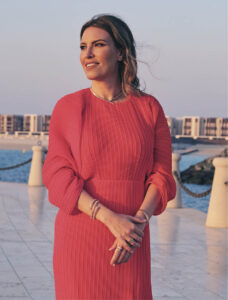
Farah wears: BVLGARI Serpenti Viper Necklace in Rose Gold set with semi-pavé Diamonds
BVLGARI Serpenti Viper Bracelet, two-coil, in Rose Gold set with pavé Diamonds
BVLGARI Serpenti Viper Bracelet, in Rose Gold set with semi-pavé Diamonds
BVLGARI Serpenti Viper Ring, two-coil, in Rose Gold set with pavé Diamonds
Dress, SOLACE London at Bloomingdale’s Dubai
This is such a huge milestone in your career, what is it that you still aim to achieve?
Honestly, awards and accolades are great of course and it’s wonderful to have your work acknowledged, rewarded and recognised. But my ultimate goal is always for the actual film to be seen. The fact that it is streaming on Netflix worldwide for example for me is a huge accomplishment. I never set out to win a BAFTA or an Oscar. What I have always been aiming for is to develop my first feature film and that’s something that I’m working on at the moment. I feel even more passionately about this film and telling the story than any of the past films I’ve made, and I want to make it with every bone and drop of blood in my body.
What are the challenges you face as a woman in the film industry?
For me, it was never about feeling challenges specifically as a woman. There are issues in the industry that I can see very clearly. I come from an investment banking background working in the City in London in a very male-dominated industry. So I learnt to have a very thick skin and to stand my ground and demand my respect and my place. So I think I brought a lot of that to filmmaking and to being a woman in film, but I certainly know that women in filmmaking experience a lot of difficulties. This can be from accessing budgets and finance to having respect and being taken seriously by what is a very white male-dominated industry. But from my experience, I can’t complain.
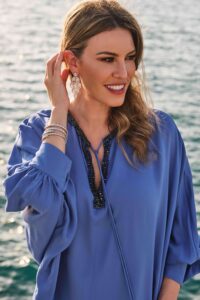
Farah wears: BVLGARI Serpenti Earrings in White Gold, set with pavé Diamonds.
BVLGARI Serpenti bracelet Viper, one-coil, in White Gold set with full pavé Diamonds.
BVLGARI Serpenti Viper Bracelet, two-coil, White Gold set with pavé Diamonds
BVLGARI Serpenti Viper Ring, two-coil, White Gold set with pavé Diamonds
BVLGARI Serpenti Tubogas Watch single spiral with rose Gold bezel, set with brilliant cut Diamonds, black Opaline dial, Rose Gold
BVLGARI Serpenti White Gold Ring set with a blue Sapphire on the head, Emerald eyes and pavé Diamonds
Kaftan, Max Mara
Tell us a little about Farah Nabulsi as a person.
My mother was born in Palestine and she moved to the UK where she met my father who was there doing his PhD at the time. I was born there and we were raised in what I consider a wonderful, privileged happy home and life in London. And we are blessed in that sense. My parents never let me forget my heritage. I consider myself to be a compassionate and sympathetic person and someone who is ethical. But as I’ve gotten older and I have the chance to reflect on all the blessings and skills I have learnt, the word responsibility has taken a whole new meaning for me. This word responsibility if you break it up means having the ability to respond and I came to a place where after my trips to Palestine, I felt I had a responsibility and the ability to respond, as a Palestinian who has had a blessed upbringing with freedom and education. I think I’ve gone through a big turning point in my life related to what I want to use my life for and the kind of work I want to be doing. So I can actually say that I’ve changed and matured in so many ways in these past ten years. In terms of what’s important to me, it would be my work and my family. I love to laugh and I am a very outgoing person but I wouldn’t say I’m a particularly social person in terms of being out and about. I have key friends in my life that I don’t have to see so often to know that they are there for me and I’m there for them. I’m quite selective in terms of who I spend quality time with. I love sports! I’ve always been a very sporty person. I care about my health and I love to laugh.
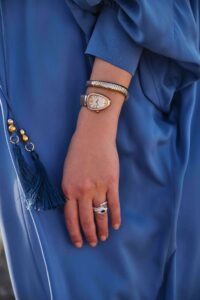
Farah wears: BVLGARI Serpenti Tubogas Watch single spiral with rose Gold bezel, set with brilliant cut Diamonds, black Opaline dial, Rose Gold
BVLGARI Serpenti White Gold Ring set with a blue Sapphire on the head, Emerald eyes and pavé Diamonds
Kaftan, Max Mara
What do you do to disconnect?
Well, I’ve always loved film and the greatest part of my job is that when I am watching films and series, I can now say I’m working which is wonderful! That has always and still is my chill-out time but now it doubles up as work! Of course, I now watch everything with a filmmaker’s eye which I never used to do and that certainly changes the way you perceive and enjoy films, it’s a very different experience, but I still love doing it and I still do it to disconnect. I love to read and doing sports is also a big disconnection for me. Actually, I have some of my best moments of inspiration while I am exercising, and it is something really important that allows me to disconnect from the stresses of my work and the stresses of the subject of my work.
What inspires you?
I think a lot of my inspiration comes from the resilience of others. When I see people rise above, injustice or indignities and somehow find their space and speak their voice, that’s what inspires me. People who against the odds can rise above and strive and be steadfast. That is hugely inspirational to me and it’s certainly what drives me and my passion for what I do.
What would be your advice to creatives in the Arab region?
My advice to the creatives in the region is to be bold, unapologetic and be themselves. We have so many stories to share and when you offer the universe something, the universe opens up to you.
What is the motto you live by?
One thing I refer to again and again is the title of a book by Susan Jeffers: “Feel The Fear And Do it Anyway”. I love and believe that. It’s OK, to feel fear, but go ahead and do what your instincts and gut push you to do.
A second quote that resonates with me is by Charles Bukowski. “If something burns your soul with purpose and desire, it is your duty to be reduced to ashes by it.” I love that.















